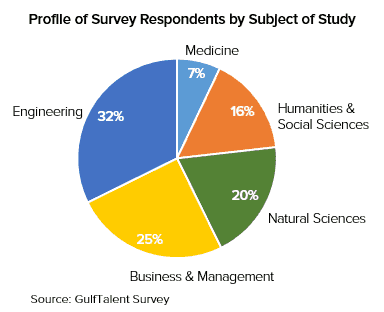Energy companies dominate ranking of most popular employers in Oman
Training & development most important factor for graduates when choosing employer
A research study just released by GulfTalent confirms Petroleum Development Oman (PDO) as the number one career choice for top Omani graduates.
GulfTalent’s study was based on a survey of 370 Omani youth who are recent graduates or final-year students at the country’s prestigious Sultan Qaboos University, based in Muscat.
The study found that, despite the recent plunge in oil prices and widespread hiring freeze across the sector, oil and gas firms remain among the most popular employers in the country for graduates, occupying one-third of the top-30 rankings, including all of the top 5 spots.
Top 30 Most Popular Employers for Omani Graduates |
|
|
|
| Source: GulfTalent Survey | |
Non-energy companies that made it to the top-30 rankings include telecom firms Omantel and Ooredoo, audit firms Ernst & Young and Deloitte, and aviation firms Oman Air and Oman Airports. Surprisingly, none of the banks made it to the list.
In recent years, the growth of companies such as Omantel has helped partly reduce the economy’s dependence on the oil and gas sector, a key element of the Omani government’s diversification strategy.
GulfTalent’s survey also found that government organisations featured heavily in the top-30 most popular employers, including several ministries. When asked explicitly what type of organisations they would most like to work for, government was the most popular option preferred by two-thirds of the graduates, followed by multinational companies, with local private-sector firms coming last.

Key Attraction Factors
The survey asked Omani graduates about the factors that drove them to choose their preferred employer. The top three factors mentioned were the quality of the company’s training and development programme, the salary offered, and the opportunity to do interesting and challenging work.
According to the study, average salary expectation of male graduates is OMR 1,000 per month, while the expectation of female graduates is slightly lower, at OMR 900 per month.

Drivers of popularity varied between different employers. The number one factor cited by graduates choosing PDO was its training programme, while for Occidental Petroleum, the top factor mentioned by graduates was its attractive compensation and benefits.
Commenting on the rankings, PDO People and Change Director, Ibtisam Al Riyami, attributed her company’s popularity to offering recruits “an inclusive, collaborative, interesting and challenging work environment, structured on-the-job training and career progression, an excellent employee value proposition and incentives.”
On the other hand, Mohammed Al Riyami, Senior Manager, Workforce Planning at Omantel, which also ranked in the top-10, mentioned his company’s practice of “engaging employees in the business and working closely with them in setting the strategy” as a key attraction for new recruits.
GulfTalent’s survey found that gender also played a part in graduates’ decision making. 9% of females cited the need to work in an Islamic work environment as a key decision factor for them, compared with just 2% of males. Work-life balance was cited as a key factor by 17% of females, compared with 9% of males.
For graduates interested in working with international companies, good company work culture and a chance to live and work abroad were major attractions, while those interested in government roles highlighted job security and work-life balance among their top 5 factors.
One in three graduates expressed interest in gaining experience working outside of Oman and were drawn to the few employers that offered this opportunity. The level of interest was much higher for male graduates at 43%, compared with just 17% of females who said they would like to work abroad.
According to the survey, the most popular country overall for Omanis to relocate to is the UK, followed by Qatar and the UAE.

Employment Success Rate
While graduates surveyed had a clear idea of their employment preferences, not all were successful in achieving them. Of those who have graduated this year and seek employment, 23% reported starting a job immediately after graduation or having a confirmed job offer.
Many graduates felt that their lack of experience was preventing them from securing employment. One petroleum engineering graduate who took part in GulfTalent’s survey commented “As graduates of SQU, I expected that oil and gas companies would be keen to employ us. But in the current market, most employers seem to be looking only for experienced hires. How can we as fresh graduates ever make it into the job market, if everyone is looking for experience?”
Some mentioned that, given the market conditions, they would be very flexible in their expectations. Maryam, one of the recent graduates said, “As a fresh graduate with no experience, I would be happy with any job that helps develop my skills, regardless of pay.“
When asked about their ideal next steps after graduation, 65% of respondents said they wished to start a job, followed by 26% who wanted to continue further study, while 9% wish to join their family business or start on their own.
Survey Methodology
GulfTalent’s study was based on a survey of 370 Omani recent graduates and final-year students from Sultan Qaboos University. The survey was conducted during June 2016. For ranking employers, each survey participant was asked to name their top 3 choices, without being presented with a pre-compiled list of choices. Employers were ranked based on the number of votes they received.

